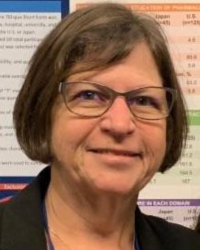Candidate Bio

Janice Hoffman-Simen is an Associate Professor of Pharmacy Practice and Administration at Western University of Health Sciences (WesternU) in Pomona, California where she teaches geriatrics, neurology, and psychiatric-related topics at the College of Pharmacy. She has taught Introduction to Geriatric Medicine Pharmacokinetics at the College of Osteopathic Medicine at WesternU for over a decade. Dr. Hoffman-Simen is the co-author of the chapter, Geriatric Prescribing Principles and Interprofessional Healthcare Team Leadership, in Springer’s 5th Edition of it’s Geriatric Medicine textbook.
Dr Hoffman-Simen has a clinical practice site at Los Angeles Jewish Health (LAJH) where student pharmacist and pharmacist resident practice under her direction. As a faculty-in-residence at LAJH, Dr. Hoffman-Simen have been responsible for the development of many clinical pharmacy programs including Antibiotic stewardship, Anticoagulation monitoring, post-fall assessments, admission medication reviews, transitions of care and discharge medication counseling by pharmacists.
Dr. Hoffman-Simen is a Board-Certified Geriatric Pharmacist with an Advanced Practice Pharmacist license. In addition, she has been honored as a Fellow of the American Society of Consultant Pharmacists. She received her Pharm.D. from the University of Southern California and completed a Post-Doctoral Residency in Clinical/Administrative Psychiatric Pharmacy Practice with an emphasis in geriatrics from the University of Maryland at Baltimore. Dr. Hoffman-Simen completed her Doctorate in Education (Ed.D.) in Organizational Leadership from the University of La Verne. Professionally, she has received accolades as the Commission for Certification in Geriatric Pharmacy (CCGP), Excellence in Geriatric Practice Award and has served as National President, Phi Lambda Sigma, Pharmacy Leadership Honor Society; Chair, California Pharmacist Association-Academy of Long-Term Care, and Past President for the California Chapter of the American Society of Consultant Pharmacists. Currently Dr. Hoffman-Simen is well respected in California and is the first pharmacist President for California’s AMDA chapter (CALTCM). She worked diligently for over 7 years with and interdisciplinary members of CALTCM members to propose a resolution to the HOD that changed AMDA’s bylaws to include doctoral prepared non-prescribers as full voting members. Since this AMDA bylaw change, Dr. Hoffman-Simen has served as chair of the CALTCM House of Delegates (HOD) delegation to the AMDA Annual meetings, presented resolutions on the HOD floor and she has presented several professional lectures at PALTC-AMDA Annual Meetings.
Candidate Statement
It is an honor to have the opportunity to represent the Society’s House of Delegates (HOD) on the AMDA Board of Directors (BOD). For the past year and a half, as President of AMDA’s California chapter, CALTCM, I have been privileged to lead our efforts in influencing LTC policy and landing a three-quarters of a million-dollar CDC Strike Team grant. I am a Board-Certified Geriatric Pharmacist with my PharmD and a post-doctorate residency in psychiatric pharmacy practice with an emphasis in geriatrics. I am an Associate Professor of Pharmacy Practice and Administration at Western University of Health Sciences in Pomona, CA, where I teach psychiatry, neurology, and geriatric related topics to student pharmacists. I have been practicing in Long-Term-Care (LTC) for over 30 years as a consultant pharmacist across the continuum of care.
The Society’s Board is presently made up of physicians, nurse practitioners and physician assistants. Diversity of thought is an important element in organizational improvement. Pharmacists, by the nature of our training, will have different experiences and views. Having a pharmacist on the Board will add yet another important and valuable perspective. As the Society continues to evolve as an organization, I believe my EdD in organizational leadership will be of additional value with conceptual change and development framework.
As a consultant pharmacist, I have worked with many medical directors, attending physicians, nurse practitioners and physician assistants over my career. There is a golden opportunity ahead of us to continue to enhance and build on the relationship AMDA has developed with ASCP. In California, under my leadership, CALTCM has worked to bring about collaboration with pertinent pharmacist societies that share our goal of improved quality patient care and safety. Long term care medicine with its complexities requires a team approach, and I am here to support you and the goals of our esteemed Society.
I have identified three goals for my Board service. The first goal aligns with AMDA’s vision to provide high-quality, compassionate, patient-centered care. “It takes a village to raise a child” and an even larger village is needed to provide individualized care for older adults. Care for our frail elders takes a high-functioning team of practitioners, each with their own area of expertise to give high-level specialized care. In LTC we look at the whole patient and their quality of life. While insurers have tried to remove the “care” in healthcare and reduced the person to a number, my goal is to support our efforts to put compassionate “care” back into person-centered healthcare for older adults.
Another goal supports AMDA’s mission in education and improving the “soft skills” needed to function well within an interprofessional team. In all types of LTC settings, the functioning of teams is only as good as their leaders. Good leadership skills including emotional intelligence in addition to clinical competencies are essential to teamwork. Through continuing education our Society must continue to address these necessary skills that ultimately lead to improved patient care and member satisfaction in the workplace. I was very excited last year to conceptualize and present a program focused on the importance of emotional intelligence, one of my favorite subjects, at the Society’s annual meeting.
Lastly, advancing the policies and procedures to match the clinical practice of today is vital to earn respect among all members and other organizations. Ensuring current, up-to-date policies and procedures for State chapters is necessary for the BOD to advance advocacy for medical directors and other members of State chapters. Furthermore, policies to partner with other organizations of different professions like the collaboration with ASCP at the national level will assist with the continued growth of State chapters and National. Working together with different disciplines to promote the role of medical directors is vital to solidifying trust and respect among members of the interprofessional team.
I close with the story that has resulted in my nomination to AMDA’s Board. An interdisciplinary group within CALTCM worked for several years on a Resolution to change the Society’s bylaws to allow non-prescribers with a doctorate level degree to be full-voting members. Once the bylaws were changed, I became President-Elect of CALTCM, as I now could lead the chapter delegates at the HOD. I have been part of the HOD, presented resolutions and chaired the California delegation since the first year this change was implemented. It would be a privilege to represent the HOD as the first pharmacist on the Society’s Board of Directors. With great respect and gratitude to each one of you for your consideration.

